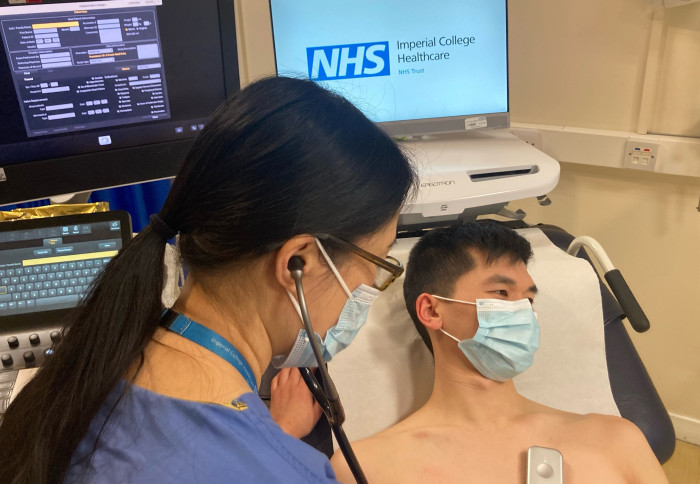Artificial Intelligence tool could help GPs diagnose heart failure
by Ellyw Evans

A demonstration of the tool being used in a mock screening
AI can help to improve the performance of ‘smart stethoscopes’, enabling doctors to diagnose heart failure earlier and improving patient outcomes.
Researchers at the National Heart and Lung Institute and Imperial’s Centre for Cardiac Engineering have completed the first-ever NHS study to evaluate an artificial intelligence (AI) technology for point-of-care detection of heart failure.
Heart failure is a condition in which the heart cannot pump blood effectively. It carries a higher risk of death than most cancers and is increasingly common, affecting 2% of the UK population and consuming 4% of the NHS budget.
This tool can save time and money for the NHS and unlock major benefits for patients through early diagnosis Dr Patrik Bachtiger
Reliably diagnosing heart failure is a major challenge for GPs as the symptoms, such as breathlessness are associated with many other conditions. Most patients who have heart failure are diagnosed in hospital after a series of tests, highlighting the need for a point-of-care screening tool.
The study published in The Lancet Digital Health and led by Professor Nicholas Peters, Head of Cardiac Electrophysiology, recruited over 1,000 NHS patients across seven sites in North West London, including Imperial College Healthcare NHS Trust (ICHNT) hospitals.
Immediate diagnosis
The researchers applied a novel AI algorithm that determines within 15 seconds whether the pumping action of their hearts is weakened and combined it with a commercially available ‘smart’ stethoscope – the Eko DUO device – that records electrocardiograms (ECGs) as well as heart sounds, enabling them to provide an immediate diagnosis of heart failure.
The study team found that the AI technology showed 91% sensitivity and 80% specificity when compared to the routine diagnostic tests that are invasive and expensive.
Dr Patrik Bachtiger, a Clinical Research Fellow in Digital Health at the NHLI and lead author of the paper, said: “This super-human capability to screen patients at any point of care, including the GP surgery, can overcome the unacceptable reality that 80% of patients with heart failure are currently diagnosed through an emergency hospital admission. The current clinical pathway simply misses too many patients, leaving them undiagnosed until very sick. This tool can save time and money for the NHS and unlock major benefits for patients through early diagnosis and starting effective treatments."
‘Game-changer for GPs’
Early diagnosis is a key determinant of the effectiveness of heart failure treatments that improve symptoms, quality of life and survival is dependent on. A lack of effective tools for GPs to confirm or rule-out heart failure leads to late diagnosis, substantially greater NHS cost and earlier death in 80% of cases.
Professor Nicholas Peters said: “This tool is a game-changer because our study shows that GPs will be able to use it in a way that fits how they examine patients to reliably rule in or rule out heart failure at the time. The result will be earlier diagnosis and treatment, avoidance of unnecessary and expensive tests in those in whom heart failure is ruled out, and therefore enable better and more cost-effective healthcare.”
NHSX AI in Health and Care Award
This research is among the first to be funded by the NIHR and NHSX Artificial Intelligence in Health and Care Award. The Award aims to accelerate the testing and evaluation of the most promising AI technologies which meet the strategic aims set out in the NHS Long Term Plan.
Commenting on the next steps, Professor Peters said: “This study lays the foundation for deploying this AI technology to unlock the clinical and health economic benefits of early diagnosis. We will now be starting the study to prove the magnitude of this benefit in many urban and rural GP practices across the UK, with a view to producing the evidence for NHS wide adoption.”
______________________________________________
'Point-of-care screening for heart failure with reduced ejection fraction using artificial intelligence during ECG-enabled stethoscope examination in London, UK: a prospective, observational, multicentre study' - by Bachtiger et al is published in The Lancet Digital Health.
Article supporters
Article text (excluding photos or graphics) © Imperial College London.
Photos and graphics subject to third party copyright used with permission or © Imperial College London.
Reporter
Ellyw Evans
Faculty of Medicine Centre